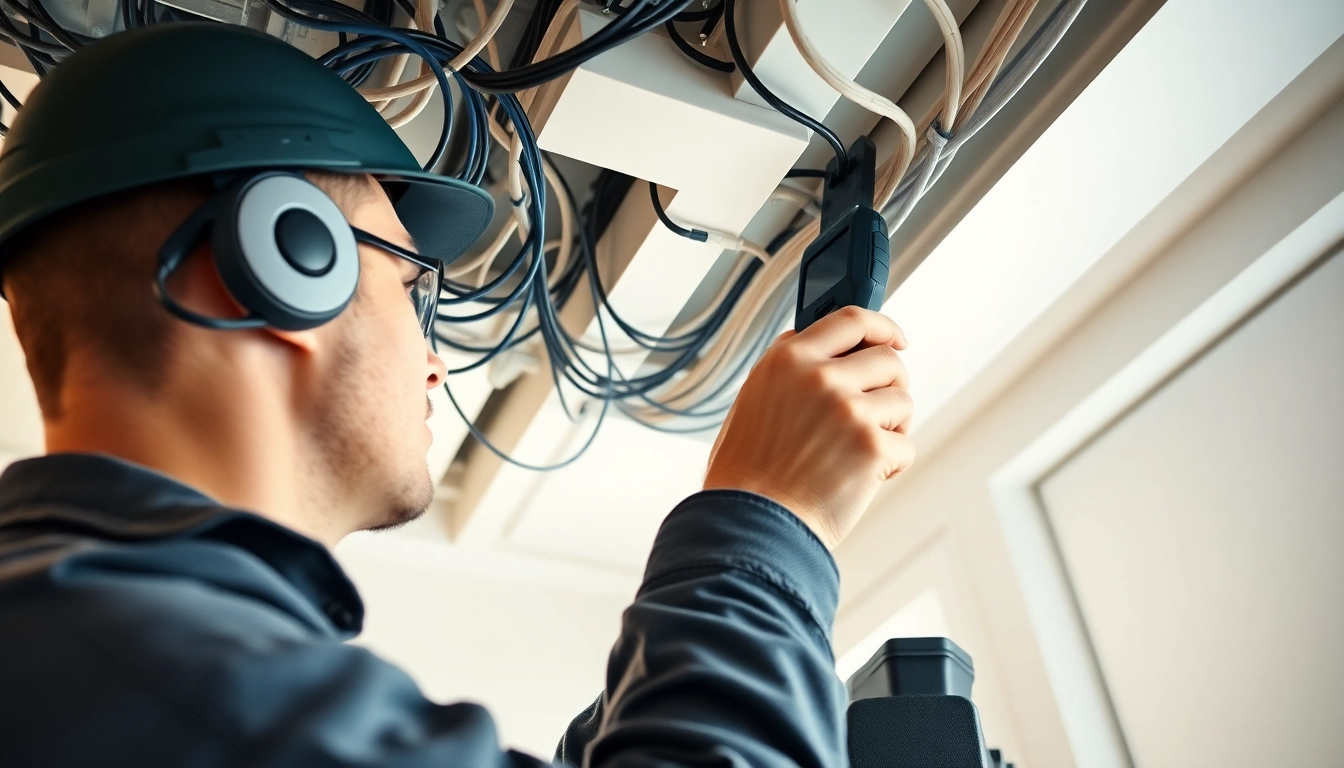Understanding Electrical Service: Basics and Importance
Electrical service is a critical component of modern life, powering our homes, businesses, and infrastructure. Understanding its basics can equip consumers and businesses alike to make informed decisions about their energy needs. From installation to maintenance, every aspect of electrical service is vital not only for convenience but also for safety. Properly functioning electrical systems enhance efficiency and sustainability, ensuring reliable power delivery in various settings. To learn more about comprehensive Electrical Service, it’s essential to delve into its core definitions, types, and significance.
Definition of Electrical Service
Electrical service encompasses the installation, maintenance, and repair of electrical systems in residential and commercial properties. This includes the distribution of electricity from the utility company’s grid to the individual premises. Key components involved in electrical service include service panels, breakers, electrical wiring, outlets, and switches. These elements work together to create a safe, efficient, and reliable electrical system. Essentially, electrical service ensures that electricity is delivered effectively and safely to the end-user.
Common Electrical Service Types
There are several types of electrical services, each tailored to specific needs. Understanding these distinctions can help homeowners and business owners make informed choices:
- Residential Electrical Services: This service covers residential installations, maintenance, and repairs. From lighting fixtures to circuit breakers, residential services address a wide range of needs, ensuring safety and efficiency in homes.
- Commercial Electrical Services: Tailored for businesses, this type of service focuses on larger-scale installations and maintenance. It may include lighting solutions tailored for offices, factories, or retail spaces, alongside specialized systems for energy efficiency.
- Industrial Electrical Services: These are advanced services designed for manufacturing and production settings. Industrial electrical services address high-voltage installations and machinery, ensuring that large-scale operations run smoothly and safely.
- Emergency Electrical Services: Available for urgent situations, emergency services provide immediate assistance in power outages or electrical failures that pose safety risks.
- Renewable Energy Services: As the world shifts towards sustainability, the installation of solar panels and related sustainable energy solutions has become increasingly popular. These services ensure the integration of renewable sources into existing electrical systems.
Why Reliable Electrical Service Matters
The importance of reliable electrical service cannot be overstated. A dependable electrical system contributes to overall safety, efficiency, and comfort in both residential and commercial environments. For instance, frequent power outages can disrupt business operations, resulting in financial losses. Here are several reasons highlighting the significance:
- Safety: Faulty electrical systems can lead to dangerous situations such as electrocution or fires. Regular inspections and repairs ensure compliance with safety codes and standards.
- Efficiency: A well-maintained electrical system minimizes energy waste, leading to lower utility bills. Reliable electrical service optimizes the performance of appliances and industrial machinery.
- Comfort: Overheads like air conditioning and heating heavily rely on consistent electrical service. It ensures comfort in homes and workplaces, making a significant difference in the quality of life.
- Property Value: Proper electrical installations and updates can boost the value of a property. Homebuyers prioritize homes with modern, safe electrical systems.
Evaluating Your Electrical Service Needs
Before initiating any electrical work, it is crucial to evaluate your specific service needs. This assessment helps determine the appropriate type of solutions and the extent of work required, ensuring optimal performance and safety.
Residential vs. Commercial Electrical Services
Residential and commercial electrical services differ significantly in scope, complexity, and regulatory requirements. Homeowners often require basic installations such as lighting and heating systems, whereas businesses may need complex networks to support various operations, IT systems, and safety measures. Understanding these differences allows for tailored electrical solutions:
- Scope: Residential services focus on individual homes and typically involve simpler systems, while commercial services handle larger facilities with multiple electrical demands.
- Codes and Regulations: Commercial properties must navigate stricter building codes and regulations, requiring specialization in compliance during installations and upgrades.
- Expertise: Electricians specializing in commercial projects often need knowledge in managing load calculations, system designs, and emergency response protocols.
Assessing Electrical Load Requirements
Assessing your electrical load requirements is a fundamental part of planning electrical services. This assessment involves calculating the total energy consumption and identifying potential upgrades necessary for system efficiency:
- Current and Future Loads: Consider your current appliances, equipment, and potential future expansions when calculating load requirements.
- Peak Demand: Analyzing periods of peak usage can help determine whether the existing electrical infrastructure can handle future demands or needs upgrading.
- Breaker Ratings: Understanding the ratings of circuit breakers ensures that they can safely handle the anticipated electrical loads.
Identifying Common Electrical Issues
Identifying common electrical issues is essential for maintaining safety and efficiency in any electrical system. Several indications suggest that an electrical system may need attention:
- Frequent Circuit Breaker Trips: This may indicate overloading circuits, faulty wiring, or a defective breaker.
- Inefficient Lighting: Flickering lights or slow-starting fixtures can suggest issues with the electrical wiring or connections.
- Burning Smells or Hot Outlets: If outlets or switches emit burning odors or feel hot to the touch, this is a critical warning sign that immediate attention is required.
Choosing the Right Electrical Service Provider
Selecting a reliable electrical service provider is crucial for ensuring your electrical work is performed safely and efficiently. Here we’ll explore essential criteria to consider when choosing an electrical service company.
Criteria for Selecting an Electrical Service Company
Several factors can help determine the most suitable electrical service provider:
- Experience: Look for electricians with a proven track record in your area of need. Experienced providers are familiar with common issues and tailored solutions.
- Licensing and Certification: Ensure the company holds the necessary licenses and certifications per local regulations, which signifies compliance with industry standards.
- Insurance Coverage: A reputable service provider should carry liability insurance to cover potential damages or accidents during the job.
- Reputation: Check online reviews, testimonials, and references to gauge the performance and reliability of the electrical service provider.
Questions to Ask Before Hiring
When interviewing potential electrical service providers, consider asking these pertinent questions:
- Can you provide references from previous clients?
- What types of services do you specialize in?
- What are your rates, including hourly charges and materials?
- How quickly can you start the project?
- What is your policy on warranties and guarantees?
Understanding Licensing and Insurance
Verification of licensing and insurance is vital for securing a qualified electrical service provider. Licensing ensures that the electrical work adheres to safety standards, while insurance provides protection against liability in case of accidents or damages. Inquire about a company’s licensing status and request proof of insurance before agreeing to hire them.
Cost Considerations for Electrical Service
Being informed about the cost considerations for electrical services helps plan budgets effectively. A clear understanding of typical pricing and influencing factors can guide you toward making sound financial decisions.
Typical Pricing for Electrical Services
Electrical service costs can vary widely based on numerous factors. Here’s a general price guide based on various services:
- Basic Service Calls: An initial service call can range from $50 to $150, generally covering inspection and troubleshooting.
- Installation of Light Fixtures: This can cost between $100 and $250, depending on complexity.
- Panel Upgrades: Upgrading an electrical panel can cost between $800 and $3,000, largely depending on the amperage increase required.
- Rewiring a Home: Major rewiring projects can range from $1,500 to $15,000 or more, depending on the size and age of the home.
Factors Affecting Electrical Service Costs
Several variables influence the cost of electrical services, including:
- Location: Costs can vary by region due to labor rates and demand. Urban areas may have higher prices compared to rural locations.
- Complexity of the Project: A simple repair may cost less than an extensive installation, so understanding the scope can help estimate expenses.
- Materials: The quality of materials used can significantly affect the overall cost; high-quality, energy-efficient fixtures may require higher upfront costs but can save money in the long term.
How to Budget for Electrical Maintenance
Budgeting for electrical maintenance involves forecasting potential expenses related to inspections, repairs, and upgrades. Practical steps can help ensure that financial resources are adequately allocated:
- Consider creating an annual maintenance plan that includes regular inspections and scheduled repairs to avoid future costly emergencies.
- Allocate funds for unexpected issues; setting aside a contingency amount can be beneficial for unforeseen repairs.
- Keep track of past expenditures to identify trends that may develop and to assist in more precise budgeting in the future.
Future Trends in Electrical Services
The future of electrical services is evolving rapidly, driven by technological advancements, renewable energy innovations, and changing consumer needs. Here are emerging trends worth noting.
Impact of Renewable Energy on Electrical Services
Renewable energy sources, such as solar and wind, are gaining traction, shifting the landscape of electrical services significantly. Here are ways this impact is manifesting:
- Increased Demand for Solar Installations: As more homeowners seek to harness solar energy, electrical service providers are adapting their offerings to include solar panel installation and maintenance.
- Energy Management Systems: Advanced energy management technologies are being integrated into existing electrical systems, enabling users to monitor and optimize their energy consumption.
Smart Technology Integration in Electrical Service
Smart technology is not just a trend but a foreseeable staple in modern electrical systems. The Internet of Things (IoT) plays a significant role in the evolution of electrical services:
- Smart Home Devices: Devices like smart thermostats, lights, and security systems are becoming commonplace. Electrical service providers must be equipped to manage installations and technical support for these devices.
- Remote Monitoring: Services equipped with monitoring systems allow homeowners and businesses to track energy usage in real time, enabling proactive management of electricity consumption.
Essential Safety Protocols and Innovations
As electrical technology advances, so does the necessity for stringent safety protocols. Future trends will likely emphasize reinforced safety measures:
- Smart Circuit Breakers: These break down electrical loads, providing better protection against overload and short circuits.
- Increased Use of Automatic Shutoff Systems: Such systems can help prevent fires or electrical failures caused by faults in wiring or appliances.
- Training and Certification: As electrical technologies evolve, ongoing education and certification will become essential for electrical professionals to stay updated with safety standards and protocol innovations.



